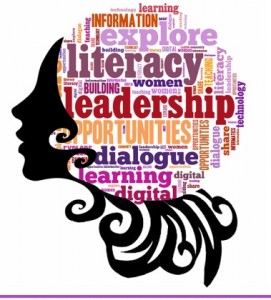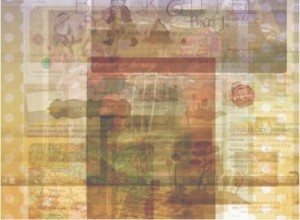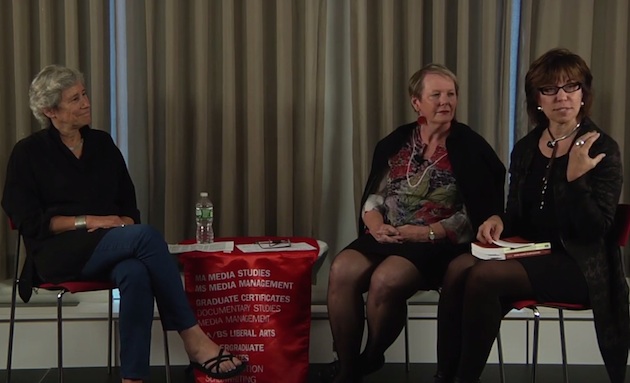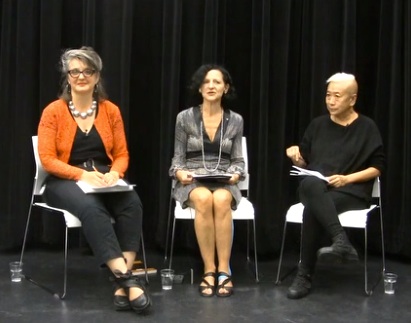FTN Roadshow Blog Series* – Feminist
By Jasmine Rault
I became involved in FemTechNet in 2013, about a year after Anne Balsamo and Alex Juhasz dreamed and schemed this project up, interested less by the focus on technology studies than by the ways that it galvanized and promised something like a feminist academic, artist, activist collective at a time when we (by which I probably mean me) most need it. I think of FemTechNet as loosely bound not by an area or object of study, but by experiments in pedagogical “technologies” – understood as styles, structures and redistributive priorities – that function as “queer survival economies” within our increasingly predatory and deadening academic industrial contexts (“queer survival economies” is of course the title of a research initiative propelled by Amber Hollibaugh and emerging from the dearly departed organization, Queers for Economic Justice).
FemTechNet used the sudden surge of enthusiasm and publicity for MOOCs, in the United States, as a kind of hook to design and launch a feminist alternative in the form of the DOCC. The most compelling thing to me about MOOCs is the promise of “free” and accessible education.[1] This promise is particularly striking for feminist scholars who have been advocating for and innovating accessible education for decades – we can think back to Jane Addams’ work, in the early part of the twentieth century, to provide free university-level education for working poor and immigrant populations in Chicago (Addams 1985; Oakes 2000; Hamington 2010); or to the Cambridge Women’s School which taught hundreds of free feminist courses to thousands of students in Boston from 1971-1992 (Burgin 2011); to feminist ‘bridging programs’ throughout the US and Canada, offering courses and university resources to encourage low-income (primarily women) students to start and continue their higher education (Conway 2001; O’Reilly 2009; Biemiller 2011); as well as the ongoing practices of transformative feminist pedagogies which have developed as critical correctives to the economic, social, political and physical inaccessibilities which continue to haunt higher education in the US (Hull, Bell Scott and Smith 1982; hooks 1994; hooks 2003; Ferguson 2012). Indeed, the promise of free and accessible education appeals to no one more than feminist educators and scholars, who have been working towards precisely these goals for over a century.
However, feminist scholarship has also taught us that technological innovations alone do not make structural changes – just as new cleaning technologies have not reduced the average amount of (vastly unequal) time that women spend on unpaid domestic labor (Vanek 1974; Bittman, Mahmud Rice, Wajcman 2004); the ‘freedom’ of cyberspace is not free of racism or sexism (Nakamura 2007); the portable computers, smartphones and tablets that liberate us from the office do not free us (particularly women) from unremunerated overtime work (Gregg 2011); the celebration of MOOCs obscures the high costs and limited access that they in fact deliver. It seems that the resources going to the development, maintenance and teaching of massive online courses could be better used to increase support for the faculty and graduate students (ie. teaching assistants) working with smaller groups of students, and the development of existing feminist instructional infrastructures.
The promise of low- or no-cost MOOCs also dovetails quite nicely with the increasing institutional reliance on low- or no-cost academic labor (in our era of unprecedented increases in tuition costs.[2] Given that seventy-six percent of university and college courses are taught by underpaid and insecurely employed contingent (adjunct) and non-tenure-track faculty who earn an average of $2,700 per course, we can see that our universities and colleges are already dependent for a vast majority of their instructional services on free labor.[3] This faculty majority join their tenure-track and tenured colleagues in what Melissa Gregg calls a culture of “‘sacrificial labor’ [which] is clearly ingrained in an industry where the notion of ‘service’ neatly obscures the amount of unpaid work inherent to major activities like journal publishing” or course development (Gregg 2010: 189). Indeed, research on academic labor conditions shows that with dramatically less institutional and monetary support for faculty, this is an industry that demands and obscures dramatically more work from all faculty, contingent or not – though it remunerates its male workers at a much higher rate than its female workers (tenure-track or tenured men make an average of $18,000 more than equally positioned women and non-tenure-track men make an average of $2,650 more, despite there being many more women working in these positions.[4]) Moreover, with the presumed ubiquity of smartphones and personal laptops, all faculty are subject to the pressure of what Gregg calls “professional presence bleed” – the expectation that faculty will be digitally available for work at every hour every day, responding to emails, updating shared online documents, posting on academic blogs, joining video meetings, etc. – but when the domestic and under-paid division of labour by gender and race remains as Bittman, Mahmud Rice and Wajcman put it, “remarkably resistant to technological innovation”[5] this pressure can be particularly hazardous for faculty who are women and/or people of color (Gregg 2011).
FemTechNet promises a kind of insurgent collectivity and distributive technology of care that engages what TL Cowan and I have written about as the ‘shadow archive’ of anti-racist feminist and queer social movements which have made possible our ambivalent, highly fraught, painfully compromised and usually exploited positions within or relationships to the contemporary university.[6] Thinking along with Roderick Ferguson’s book, The Reorder of Things, one of the acute ironies of contemporary feminist academic work is that we are operating in a moment when the US university has already said, and continues to say, ‘yes! but of course!’ to the demands, made by anti-racist and feminist movements from the 1950s through 80s, that universities become institutions which meet the needs and interests and reflect the knowledges of minoritized populations — working classes, people of color, immigrants, women, gays and lesbians. This institutionalized ‘yes’ is precisely the productive operation of power that Michel Foucault began to chronicle for us in the 1970s and which our feminist academic collectives negotiate today. FemTechNet operates in a climate where so many of the demands and struggles for redistributive gender, racial, ethnic, sexual and economic justice have been incorporated, archived and affirmed as rights (and sometimes departments, disciplines and degrees) and administered by universities which don’t resist but claim to share our dreams. These insurgent movements and histories have not been denied or negated but their potentialities archived, appropriated and disciplined. Feminist collectives in the contemporary university might, thus, be understood as doing archival work, tending to the shadow of the institutionalized archive, to the dark radical politics that the archive seeks but cannot contain.
FemTechNet might be considered a repository of the intellectual, political and affective traces of the university’s fraught recognition. Such a collective is the embodiment of unlicensed hope, an affective survival economy and a network of shared purpose, driven by a refusal to be consumed by the lived experiences of these ironies of power in which we receive tacit intellectual support for this work– “yes, teach a course on feminist pedagogies, queer politics, crip theory, or critical race studies”–and explicit employment negligence–“no, as a part-time faculty member you will not be allowed to make enough money to live, have a predictable income, nor have access to a research stipend, nor to a regular office” and so on. These collectives, these shadow archives and repertoires, are the residues, excesses, of affect, analysis and action, left unresolved in the face of the university’s ironic institutionalization of these knowledges and movements–incorporating their scholarly practices as an inoculation against their politics.
Works Cited
Addams, J. (1977). On Education. Edited by Ellen Condliffe Lagemann. New Brunswick, New Jersey: Transaction Publishers.
American Association of University Professors. (2012-2013). Annual Report on the Economic Status of the Profession. Washington, DC.
Balsamo, A. & Juhasz, J. (2012). “An Idea Whose Time is Here: FemTechNet – a Distributed Online Collaborative Course.” Ada: A Journal of Gender, New Media & Technology. 1. https://adanewmedia.org/2012/11/issue1-juhasz/
Behrmann, Boyer, Cole, Cowan, Gajjala, Losh, Rault & Wexler. (2015). “Transforming Higher Education with Distributed Open Collaborative Courses (DOCCs): Feminist Pedagogies and Networked Learning.” In MOOCs and Open Education Around the World Curtis J. Bonk, Mimi Miyoung Lee, Thomas C. Reeves, eds. New York: Routledge Press.
Biemiller, L. (2011, September 11). “Women’s colleges try new strategies for success.” Chronicle of Higher Education. Retrieved from https://chronicle.com/article/Womens-Colleges-Try-New/128935/
Bittman, M., Mahmud Rice, J., & Wajcman, J. (2004). “Appliances and their impact: The ownership of domestic technology and time spent on household work.” The British Journal of Sociology, 55(3), 401-423.
Burgin, S. (2011) “Coarse offerings: Lessons from the Cambridge Women’s School for today’s radical education alternatives.” Graduate Journal of Social Science, 8(2).
Christensen, G., & Alcorn, B. (2014, March 16). “The revolution is not being MOOC-ized, Students are educated, employed, and male.” UPenn, Slate. Retrieved from https://www.slate.com/articles/health_and_science/new_scientist/2014/03/mooc_survey_students_of_free_online_courses_are_educated_employed_and_male.html
Conway, J. K. (2001). A woman’s education. New York: A.A. Knopf.
Downes, S. (2008). “MOOC- The resurgence of community in online learning.” Retrieved from https://halfanhour.blogspot.com/2013_05_01_archive.html
Ferguson, Roderick A. (2012). The Reorder of Things: The University and Its Pedagogies of Minority Difference. Minneapolis, MN: University of Minnesota Press.
Hamington, M. (2010). Feminist interpretations of Jane Addams. University Park, PA: Pennsylvania State University Press.
hooks, b. (2003). Teaching community: A pedagogy of hope. New York: Routledge.
Hull, G. T., Scott, P. B., & Smith, B. (1982). All the women are White, all the Blacks are men, but some of us are brave: Black women’s studies. Old Westbury, NY: Feminist Press.
Kuh, G. D. (2008). High-impact educational practices: What they are, who has access to them, and why they matter. Association of American Colleges and Universities. Washington, DC.
Kuh, G. D., & O’Donnell, K. (2013). “Ensuring quality & taking high-impact practices to scale.” Association of American Colleges and Universities, Washington, DC.
Nakamura, L. (2007). Digitizing race: Visual cultures of the Internet. Minneapolis: University of Minnesota Press.
Newman, J., & Oh, S. (2014, June 13). “8 things you should know about MOOCs.” The Chronicle of Higher Education. Retrieved from https://chronicle.com/article/MOOCs-EdX/146901/
Oakes, J. (2000). “Course-taking and achievement: Inequalities that endure and change.” A keynote paper presented at the National Institute for Science Education Forum, Detroit, MI.
Pappano, L. (2012, November 2). “The year of the MOOC.” The New York Times. Retrieved from https://www.nytimes.com/2012/11/04/education/edlife/massive-open-online-courses-are-multiplying-at-a-rapid-pace.html?pagewanted=all
Rich, A. (1979). “Claiming an education.” In On lies secrets and silence: Selected prose, 1966-78 (pp. 231-235). New York: W.W. Norton.
Roth, M. (2013, April 29). “My modern experience teaching and MOOC.” Chronicle of Higher Education. Retrieved from https://chronicle.com/article/My-Modern-MOOC-Experience/138781/
Stansbury, M. (2014, April 17). INFOGRAPHIC: Global MOOC statistics. eCampus News. Retrieved from https://www.ecampusnews.com/research/infographic-moocs-global-436/
University Committee on Planning and Budget Systemwide Academic Senate (2010). The Choices Report. Oakland, CA: University of California.
Vanek, J. (1977b) “Uncertainty and the investment decision under labor-management and their social efficiency implications.” In The Labor Managed Economy: Essays by Jaroslav Vanek. Ithaca, NY: Cornell University Press.
[1] Sections of this talk are published in the essay “Transforming Higher Education with Distributed Open Collaborative Courses (DOCCs): Feminist Pedagogies and Networked Learning,” co-authored with Radhika Gajjala, Liz Losh, Laura Wexler and T.L. Cowan, in MOOCs and Open Education Around the World Curtis J. Bonk, Mimi Miyoung Lee, Thomas C. Reeves, eds. New York: Routledge Press, 2015
[2] Over the past decade tuition at private and state colleges and universities in the US has increased at a higher rate than at any time in recorded history, with the average four-year public university tuition increasing 27% since 2008, but in places like California and Arizona it has increased 70% (U.S. Department of Education, Ed.gov, June 27, 2013; Kellie Rowe, USAToday.com, June 24, 2013; Christine Armario, USAToday.com, June 13, 2012).
[3] AAUP “Annual Report on the Economic Status of the Profession” 2012-2013; Curtis and Thornton Academe, March-April 2013; Tamar Lewin New York Times, April 8, 2013.
[4] AAUP “Annual Report,” Table 5 and E.
[5] Bittman, Mahmud Rice and Wajcman 2004: 401
[6] TL Cowan and I have written about this in an unpublished essay, “Caring for the Shadow Archives: Feminist Collectives as Network Technology & Survival Economy” (2014).
*FemTechNet Roadshow Blog Series – Over the past couple of months, about a dozen FemTechNet participants have presented work based on our research and teaching related to FemTechNet in a two-part FemTechNet Keywords Workshop at the CUNY Feminist Pedagogies Conference in April 2015, and at the Union for Democratic Communications Conference at the University of Toronto in May 2015. Since these gatherings brought together such divergent modes of FemTechNet engagement, we thought we’d collect and share this new work over the last two weeks of May, leading up to the deadline for our 2015 FTN Summer Workshop. For more information on this series, contact T.L. Cowan





